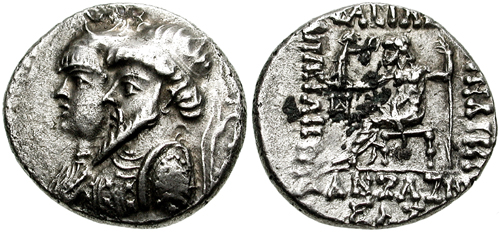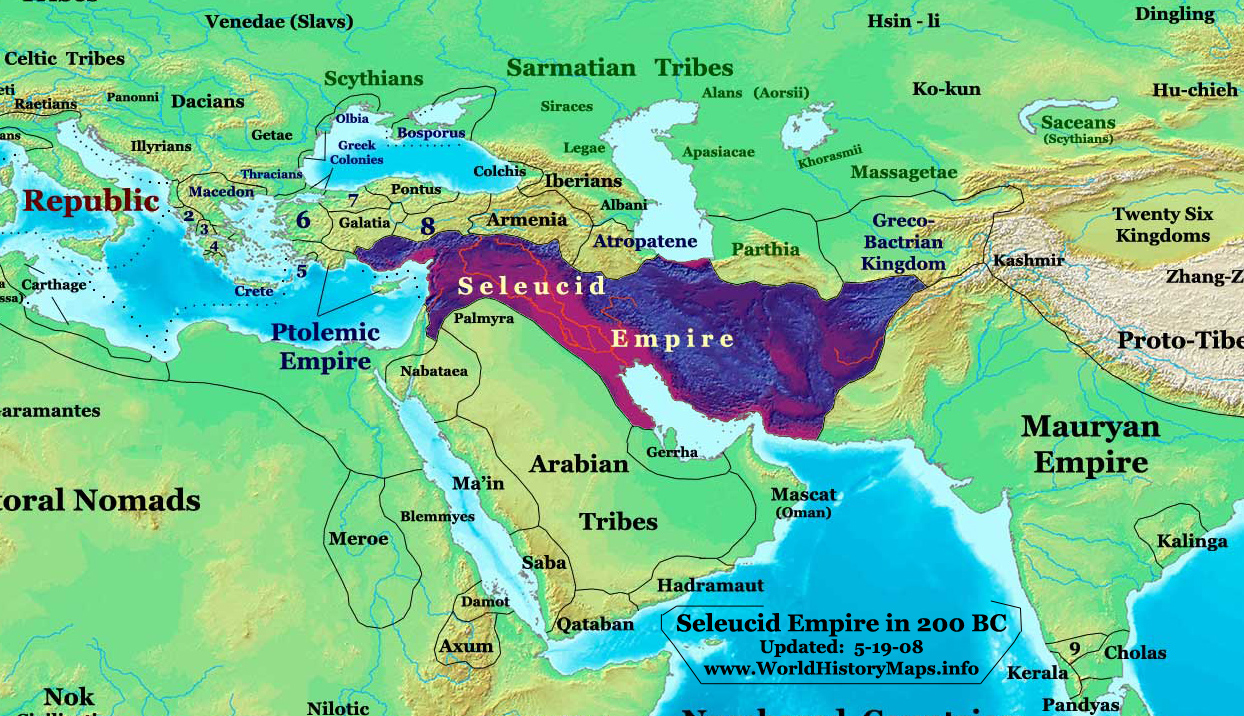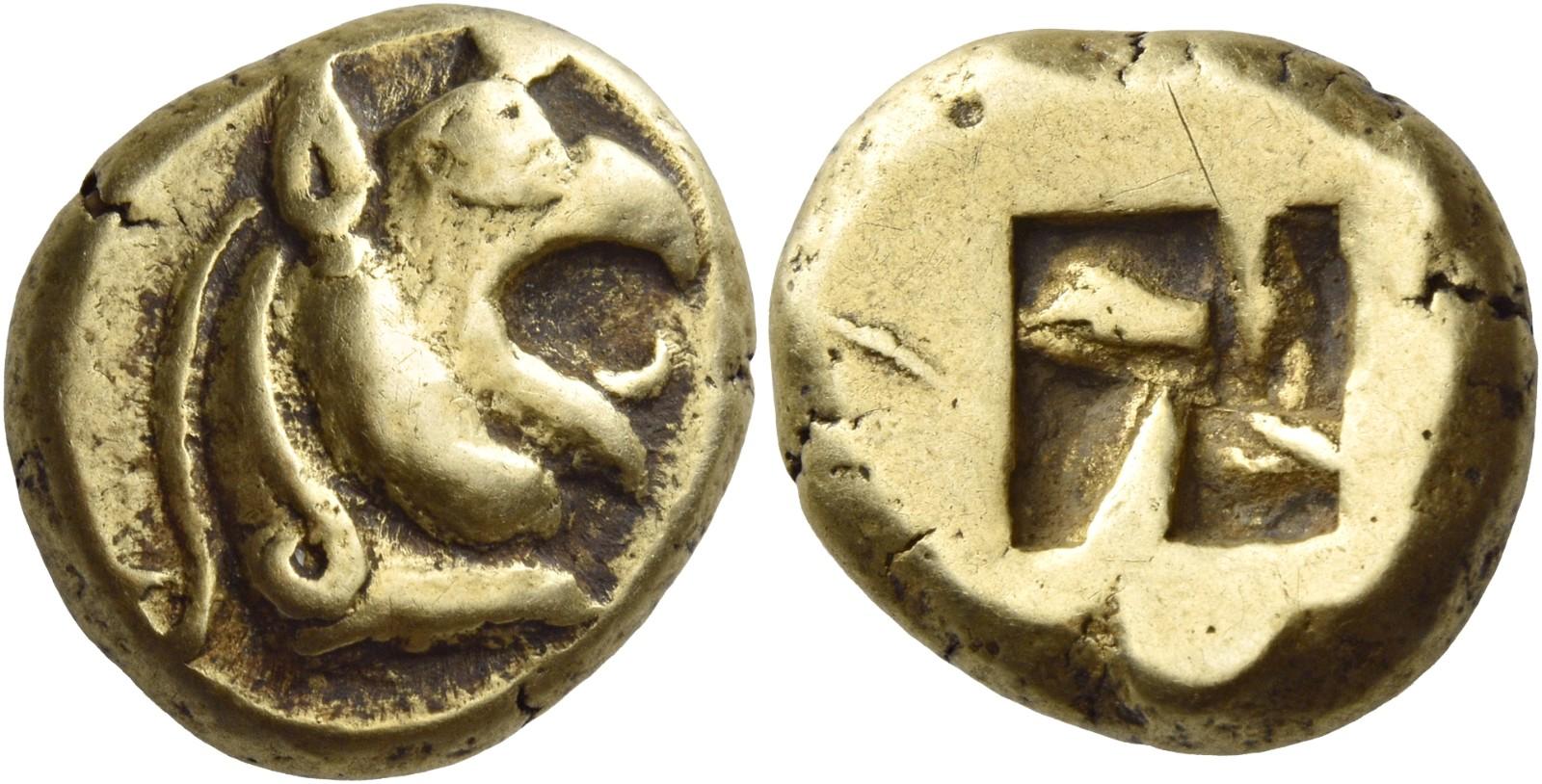|
Seleucus IV Philopator
Seleucus IV Philopator ( Greek: Σέλευκος Φιλοπάτωρ, ''Séleukos philopátо̄r'', meaning "Seleucus the father-loving"; 218 – 3 September 175 BC), ruler of the Hellenistic Seleucid Empire, reigned from 187 BC to 175 BC over a realm consisting of Syria (now including Cilicia and Judea), Mesopotamia, Babylonia and Nearer Iran (Media and Persia). Biography Birth and family He was the second son and successor of Antiochus III the Great and Laodice III. He was made heir to his father after the death of his elder brother Antiochus the young king, in 193 BC. Seleucus IV wed his sister Laodice IV, by whom he had three children: two sons Demetrius I Soter, Antiochus and a daughter Laodice V. Seleucid conflict with Rome During the prelude to the Roman-Seleucid War, Seleucus was put in charge of the re-established colony of Lysimacheia by his father. Upon the outbreak of war, Seleucus commanded his own force, unsuccessfully besieging Pergamon, and taking th ... [...More Info...] [...Related Items...] OR: [Wikipedia] [Google] [Baidu] |
Basileus
''Basileus'' () is a Greek term and title that has signified various types of monarchs throughout history. In the English language, English-speaking world, it is perhaps most widely understood to mean , referring to either a or an . The title was used by sovereigns and other persons of authority in ancient Greece (especially during the Hellenistic period), the Byzantine emperors, and the List of kings of Greece, kings of modern Greece. The name Vassilios, Basileios (Basil (name), Basil), deriving from the term ''basileus'', is a common given name in the Eastern Orthodox Church and Syriac Orthodox Church for the Maphrian. The feminine forms are ''basileia'' (), ''basilissa'' (), ''basillis'' (), or the archaic ''basilinna'' (), meaning or . The related term ''basileia'' () has meanings such as 'sovereignty', 'royalty', 'kingdom', 'reign', 'dominion' and 'authority'. Etymology The etymology of ''basileus'' is uncertain. The Mycenean Greek, Mycenaean form was *''gʷasileus'' (L ... [...More Info...] [...Related Items...] OR: [Wikipedia] [Google] [Baidu] |
Babylonia
Babylonia (; , ) was an Ancient history, ancient Akkadian language, Akkadian-speaking state and cultural area based in the city of Babylon in central-southern Mesopotamia (present-day Iraq and parts of Kuwait, Syria and Iran). It emerged as an Akkadian-populated but Amorites, Amorite-ruled state . During the reign of Hammurabi and afterwards, Babylonia was retrospectively called "the country of Akkad" ( in Akkadian), a deliberate archaism in reference to the previous glory of the Akkadian Empire. It was often involved in rivalry with the older ethno-linguistically related state of Assyria in the north of Mesopotamia and Elam to the east in Ancient Iran. Babylonia briefly became the major power in the region after Hammurabi (floruit, fl. –1752 BC middle chronology, or –1654 BC, short chronology timeline, short chronology) created a short-lived empire, succeeding the earlier Akkadian Empire, Third Dynasty of Ur, and Old Assyrian Empire. The Babylonian Empire rapidly fell apar ... [...More Info...] [...Related Items...] OR: [Wikipedia] [Google] [Baidu] |
Pharnaces I Of Pontus
Pharnaces I (; lived 2nd century BC) was the fifth king of Pontus. Of Persian and Greek ancestry, he was the son of King Mithridates III of Pontus and his wife Laodice, whom he succeeded on the throne. Pharnaces had two siblings: a brother called Mithridates IV of Pontus and a sister called Laodice who both succeeded Pharnaces. He was born and raised in the Kingdom of Pontus. Life The date of his accession cannot be fixed with certainty; but it is certain, at least, that he was on the throne before 183 BC, in which year he succeeded in reducing the important city of Sinope, which had been long an object of ambition to the Kings of Pontus. The Rhodians sent an embassy to Rome to complain of this aggression, but without effect. About the same time Pharnaces became involved in disputes with his neighbour, King of Pergamon, Eumenes II, which led to repeated embassies from both monarchs to Rome, as well as to partial hostilities. But in the spring of 181 BC, without waiting for th ... [...More Info...] [...Related Items...] OR: [Wikipedia] [Google] [Baidu] |
Achaean League
The Achaean League () was a Hellenistic period, Hellenistic-era confederation of polis, Greek city-states on the northern and central Peloponnese. The league was named after the region of Achaea (ancient region), Achaea in the northwestern Peloponnese, which formed its original core. The first league was formed in the fifth century BC. Although the first Achaean League is much less well documented than its later revival, it maintained a recognizable federal structure through the early Hellenistic period, but later fell into a period of dormancy under growing Macedonia (ancient kingdom), Macedonian influence. The more famous second Achaean League was established in 280 BC. As a rival of Antigonid Macedon and an ally of the Roman Republic, the league played a major role in the Macedonian Wars, expansion of Rome into Greece. This process eventually led to the League's conquest and dissolution by the Romans in 146 BC. The League represents the most successful attempt by the Greek city- ... [...More Info...] [...Related Items...] OR: [Wikipedia] [Google] [Baidu] |
Elymais
Elymais or Elamais (Ἐλυμαΐς, Hellenic form of the more ancient name, Elam) was an autonomous state of the 2nd century BC to the early 3rd century AD, frequently a vassal under Parthian control. It was located at the head of the Persian Gulf in Susiana (the present-day region of Khuzestan, Iran). Most of the population probably descended from the ancient Elamites, who once had control of that area. General information The Elymaeans were reputed to be skilled archers. In 187 BC, they killed Antiochus III the Great after he had pillaged their temple of Bel. Nothing is known of their language, even though Elamite was still used by the Achaemenid Empire 250 years before the kingdom of Elymais came into existence. A number of Aramaic inscriptions are found in Elymais. The region's "wealth in silver and gold" is referred to in the deutero-canonical work 1 Maccabees, which refers to Elymais as a "city" of interest to Antiochus IV Epiphanes: the narrative there states ... [...More Info...] [...Related Items...] OR: [Wikipedia] [Google] [Baidu] |
Bel (mythology)
Bêl (; from ) is a title signifying 'lord' or 'master' applied to various gods in the Mesopotamian religion of Akkad, Assyria, and Babylonia. The feminine form is ''Bêlit'' ('Lady, Mistress') in Akkadian. ''Bel'' is represented in Greek as Belos and in Latin as Belus. ''Belit'' appears in Greek form as Beltis (Βελτις). Linguistically, ''Bel'' is an East Semitic form cognate with the Northwest Semitic Baal with the same meaning. ''Bel'' was especially used for the Babylonian god Marduk in Assyrian and neo-Babylonian personal names or mentioned in inscriptions in a Mesopotamian context. Similarly, ''Bêlit'' mostly refers to Marduk's spouse Sarpanit. Marduk's mother, the Sumerian goddess often referred to in the Sumerian language as Ninhursag, Damkina, and Ninmah, was often known as ''Belit-ili'' ('Lady of the Gods') in Akkadian. Other gods called "Lord" were sometimes identified totally or in part with Bel Marduk. The god Malak-bel of Palmyra is an exampl ... [...More Info...] [...Related Items...] OR: [Wikipedia] [Google] [Baidu] |
Galatian War
The Galatian War was a war fought in 189BC between the Galatian Gauls and the Roman Republic, supported by their ally Pergamum. The war was fought in Galatia in central Asia Minor, in present-day Turkey. The Romans had just defeated the Seleucids in the Roman–Seleucid War and were in the midst of concluding a treaty with the latter. The Romans had then turned their attention towards the Gallic tribes of Galatia who were known for making frequent raids into other cities in Asia Minor and possessing much loot. Ancient historians noted that Gnaeus Manlius Vulso, the consul, had justified the invasion by saying that it was in retaliation for the Galatians supplying troops to the Seleucids during the war, and that Vulso had embarked on this campaign without the permission of the Roman Senate. However, modern historians argue that the war had either the covert or tacit approval of the Senate. Joined by troops from Pergamum, the Romans marched inland, avoiding cities held by the Se ... [...More Info...] [...Related Items...] OR: [Wikipedia] [Google] [Baidu] |
Roman Republic
The Roman Republic ( ) was the era of Ancient Rome, classical Roman civilisation beginning with Overthrow of the Roman monarchy, the overthrow of the Roman Kingdom (traditionally dated to 509 BC) and ending in 27 BC with the establishment of the Roman Empire following the War of Actium. During this period, Rome's control expanded from the city's immediate surroundings to hegemony over the entire Mediterranean Sea, Mediterranean world. Roman society at the time was primarily a cultural mix of Latins (Italic tribe), Latin and Etruscan civilization, Etruscan societies, as well as of Sabine, Oscan, and Greek cultural elements, which is especially visible in the Ancient Roman religion and List of Roman deities, its pantheon. Its political organisation developed at around the same time as direct democracy in Ancient Greece, with collective and annual magistracies, overseen by Roman Senate, a senate. There were annual elections, but the republican system was an elective olig ... [...More Info...] [...Related Items...] OR: [Wikipedia] [Google] [Baidu] |
Treaty Of Apamea
The Treaty of Apamea was a peace treaty conducted in 188 BC between the Roman Republic and Antiochus III, ruler of the Seleucid Empire. It ended the Roman–Seleucid War. The treaty took place after Roman victories at the Battle of Thermopylae (in 191 BC), the Battle of Magnesia (in 190 BC), and after Roman and Rhodian naval victories over the Seleucid navy. Terms of the treaty The treaty, according to Appian, obliged Antiochus III to abandon Europe altogether and all of Asia west of the Taurus Mountains. He had to surrender all the war elephants in his possession and was limited to twelve warships for the purpose of keeping his subjects under control, but he was allowed to build more if he was attacked. Antiochus was barred from recruiting mercenaries "north of the Taurus" (that is, from territory just ceded to Roman allies Pergamon and Rhodes) and entertaining fugitives from the same. Antiochus had to give twenty hostages, whom the Roman consul would select. The hostages shoul ... [...More Info...] [...Related Items...] OR: [Wikipedia] [Google] [Baidu] |
Battle Of Magnesia
The Battle of Magnesia took place in either December 190 or January 189 BC. It was fought as part of the Roman–Seleucid War, pitting forces of the Roman Republic led by the Roman consul, consul Lucius Cornelius Scipio Asiaticus and the allied Kingdom of Pergamon under Eumenes II of Pergamum, Eumenes II against a Seleucid Empire, Seleucid army of Antiochus III the Great. The two armies initially camped northeast of Magnesia ad Sipylum in Asia Minor (modern-day Manisa, Turkey), attempting to provoke each other into a battle on favorable terrain for several days. When the battle finally began, Eumenes managed to throw the Seleucid left flank into disarray. While Antiochus' cavalry overpowered his adversaries on the right flank of the battlefield, his army's center collapsed before he could reinforce it. Modern estimates give 10,000 dead for the Seleucids and 5,000 killed for the Romans. The battle resulted in a decisive Roman-Pergamene victory, which led to the Treaty of Apamea t ... [...More Info...] [...Related Items...] OR: [Wikipedia] [Google] [Baidu] |
Phocaea
Phocaea or Phokaia (Ancient Greek language, Ancient Greek: Φώκαια, ''Phókaia''; modern-day Foça in Turkey) was an ancient Ionian Ancient Greece, Greek city on the western coast of Anatolia. Colonies in antiquity, Greek colonists from Phocaea founded the colony of Massalia (modern-day Marseille, in France) in 600 BC, Emporion (modern-day Empúries, in Catalonia, Spain) in 575 BC and Elea (modern-day Velia, in Campania, Italy) in 540 BC. Geography Phocaea was the northernmost of the Ionian cities, on the boundary with Aeolis. It was located near the mouth of the river Hermus (now Gediz River, Gediz), and situated on the coast of the peninsula separating the Gulf of Cyme (Aeolis), Cyme to the north, named for the largest of the Aeolis, Aeolian cities, and the Gulf of Smyrna (now İzmir) to the south. Phocaea had two natural harbours within close range of the settlement, both containing a number of small islands. Phocaea's harbours allowed it to develop a thriv ... [...More Info...] [...Related Items...] OR: [Wikipedia] [Google] [Baidu] |
Attalid Dynasty
The Kingdom of Pergamon, Pergamene Kingdom, or Attalid kingdom was a Greek state during the Hellenistic period that ruled much of the Western part of Asia Minor from its capital city of Pergamon. It was ruled by the Attalid dynasty (; ). The kingdom was a rump state that was created from the territory ruled by Lysimachus, a general of Alexander the Great. Philetaerus, one of Lysimachus' lieutenants, rebelled and took the city of Pergamon and its environs with him; Lysimachus died soon after in 281 BC. The new kingdom was initially in a vassal-like relationship of nominal fealty to the Seleucid Empire, but exercised considerable autonomy and soon became entirely independent. It was a monarchy ruled by Philetaerus's extended family and their descendants. It lasted around 150 years before being eventually absorbed by the Roman Republic during the period from 133–129 BC. History From autonomy to independence (282–241 BC) Philetaerus rose from humble origi ... [...More Info...] [...Related Items...] OR: [Wikipedia] [Google] [Baidu] |









